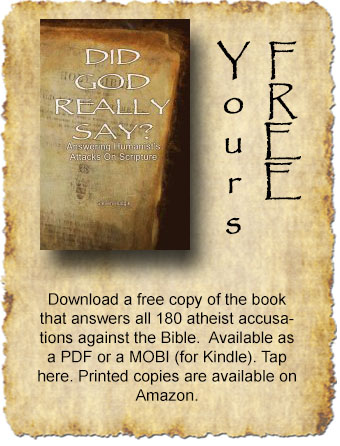Atheist's Attacks
Answering Humanist's Accusations Against the Bible


Poor Science Fails in Attacking Scripture
Does the Bible Make Serious Scientific Mistakes? No!
THE HUMANIST'S CLAIM: The Bible is also incorrect in saying the bat is a bird (Leviticus 11:13,19), the hare and rock badger chew the cud (Leviticus 11:5-6), and the mustard seed “is the smallest of all seeds” (Matthew 13:32).
Finally, it’s inconsistent with science – and ludicrous – to believe that God confounded the language of humans because he was afraid they would build a tower high enough to reach heaven (Genesis 11:1-9)
These common "objections" have been answered many times. As we always do we will start with scripture.
Question About Bats & Birds
These, moreover, you shall detest among the birds; they are abhorrent, not to be eaten: the eagle and the vulture and the buzzard, and the kite and the falcon in its kind, every raven in its kind, and the ostrich and the owl and the sea gull and the hawk in its kind, and the little owl and the cormorant and the great owl, and the white owl and the pelican and the carrion vulture, and the stork, the heron in its kinds, and the hoopoe, and the bat. - Leviticus 11:13-19
The answer is in the definition of the Hebrew word translated as "bird." The Hebrew word used here is "oph," Strong's 5775. The literal translation is "flying creatures." Is a bat a flying creature? Yes. Does a bat then belong on this list? Yes. Case closed.
Why does the translator use the word “bird” instead of “flying creature?” Because the context in Leviticus is that of birds. Scripture is giving a list of flying creatures that were mostly birds, so the translator chose the simplest translation to English, and used the word “birds.”
BTW, if you have not heard of it before, "Strong's” is an exhaustive concordance of the Bible... meaning it lists every word in the Bible and shows every verse where that word is used. It also includes both a Hebrew and Greek dictionary allowing you to look up the meaning of words. It is a very handy Bible reference and not very expensive.
Hares and Rock Badgers Chew Cud
Likewise, the shaphan, for though it chews cud, it does not divide the hoof, it is unclean to you; the rabbit also, for though it chews cud, it does not divide the hoof, it is unclean to you;and the pig, for though it divides the hoof, thus making a split hoof, it does not chew cud, it is unclean to you. - Leviticus 11:5-6
We do not need to look at the original language for this one. The Hebrew means "‘raising up what has been swallowed". That is what the English language phrase “chew the cud” means... most of the time.
Animals that chew their cud, such as cows, sheep and goats, partially chew their food, swallow it into one stomach, then later regurgitate it and chew it again. They are called "ruminants" and have multiple stomachs to regurgitate and reprocess their food.
It turns out that hares and rock badgers do the same thing, but do it using one stomach and a different process. However, what they do is so similar to ruminants that Linnaeus, the father of the modern classification system, initially classified them as ruminants. (more information here).
Hares and rock badgers chew their food, swallow it, and it goes through the animal and is passed out. These "pellets" are different from their regular "poop." They re-eat the pellets, chew their food again, and on the second time through their stomach it is fully digested. So hares and rock badgers do chew cud. They just do it with a single stomach and by eating their poop.
Is the mustard seed the smallest of all seeds?
He presented another parable to them, saying, “The kingdom of heaven is like a mustard seed, which a man took and sowed in his field; and this is smaller than all other seeds, but when it is full grown, it is larger than the garden plants and becomes a tree, so that the birds of the air come and nest in its branches. - Matthew 13:31-32
By referring only to verse 32, the humanist left out the context given in verse 31, which is important for answering this accusation.
What type of seed is this? A seed, which is "sowed in a field." That means local farmers are familiar with this seed. Jesus is not talking about all seeds, but the smallest seed the local farmers would plant. For people in Judah at the time of Jesus, the mustard seed would be the one that meets these requirements.
God confounded the language of humans
Why? The humanist says it was because God was afraid they would build a tower high enough to reach heaven. Here is the scripture. Did the humanists get the reason right? Nope.
Now the whole earth used the same language and the same words. It came about as they journeyed east, that they found a plain in the land of Shinar and settled there. They said to one another, “Come, let us make bricks and burn them thoroughly.” And they used brick for stone, and they used tar for mortar. They said, “Come, let us build for ourselves a city, and a tower whose top will reach into heaven, and let us make for ourselves a name, otherwise we will be scattered abroad over the face of the whole earth.” The Lord came down to see the city and the tower which the sons of men had built. The Lord said, “Behold, they are one people, and they all have the same language. And this is what they began to do, and now nothing which they purpose to do will be impossible for them. Come, let Us go down and there confuse their language, so that they will not understand one another’s speech.” So the Lord scattered them abroad from there over the face of the whole earth; and they stopped building the city. Therefore its name was called Babel, because there the Lord confused the language of the whole earth; and from there the Lord scattered them abroad over the face of the whole earth. - Genesis 11:1-9
The people of the earth wanted to build a tower into heaven. However, that is not the reason God gives for stopping them. We need more information.

In Genesis 9 God told the people to "increase in number and fill the earth." What did the people do? They decided to stay in one place, and build a gigantic tower as a symbol of their power—"let us make a name for ourselves." Why do they want to do that? "Otherwise we will be scattered abroad over the face of the whole earth."
The people were directly opposing God's command to fill the earth, and the tower was a symbol of how they could work together and how powerful they were... even powerful enough to oppose the will of God.
How does God define the problem? "they are one people, and they all have the same language... nothing which they purpose to do will be impossible for them."
How does God solve the problem? He addresses it directly. He confuses their languages so they cannot understand one another and work together. Then He scatters them over the face of the whole earth. The solution perfectly fits the problem, and it is not about what the humanist claimed.
Conclusion: The humanist accusations are without merit, once you know the rest of the story.
WHAT'S NEXT? A science wrap-up they call: Overall Effect of Bible Science
White summarizes the historical results of relying on the Bible for answers about the physical world. It’s not a pretty sight: “[T]here were developed, in every field, theological views of science which have never led to a single truth – which, without exception, have forced mankind away from the truth, and have caused Christendom to stumble for centuries into abysses of error and sorrow.”
In view of the Bible’s numerous mistaken beliefs about the physical world, there’s no reason to think its writers were any more correct about unseen and abstract matters. Being so greatly in error regarding the tangible and observable universe, the Bible cannot be considered a reliable guide for spiritual and ethical issues.
A complete fabrication. I'll show you why on the next page. Click here...
THE ANSWER TO RIOTS

Everything is falling apart, nothing makes sense anymore. What's happening?
What is happening is that the world has turned away from God. When nations turn away from God, strangely enough, God turns His back on them. We find out what it is like to live without God.
There is only one thing to do... repent, turn to Jesus Christ in obedience. Jesus said:
If you love Me, you will keep My commandments. - John 14:15
This can only be done on an individual basis. Don't look to others turning to God and making things better for you. YOU must repent, turn away from disobedience. Love God! Obey what He says. Read the Bible to find out what He says.
It happens one person at a time, starting with you. Don't put it off today. Turn to Jesus Christ, God who came to earth in human flesh to save us from the penalty we've earned as a result of our disobedience (sin). He will do it! ...
BUT ONLY when you believe this is true and put your trust in Jesus. Trust Jesus today. Repent (turn away from what the world wants and to what God wants).
Jesus began to preach, “Repent, for the kingdom of heaven has come near.” - Matthew 4:17
